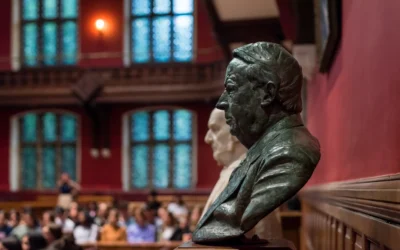The world of law has been on our screens for many years: Suits, Law and Order, even Legally Blonde. Although no-doubt over-dramatised for entertainment, the big screen represents how diverse and engaging a career in law can be.
The world of law requires people with a variety of skills. If you’re outgoing and enjoy debate and public speaking, then the prosecution and defence law of the courtroom could be for you, but if you prefer quieter, methodical work, then the work of a solicitor or litigator might take your fancy. The one thing all lawyers have in common is a rigorous attention to detail, an ability and desire to pore over the intricate nuances of the law in order to do the best for their clients.
Being a lawyer is hard work with long hours and a considerable amount of pressure, but if you like a challenge and thrive in a competitive environment, the rewards are great.
Experience first-hand what it’s really like to study and work in the legal field with our Law summer school in Oxford.
Which Subjects Do You Need to Become a Lawyer?
Many law firms encourage future applicants to study as widely as possible before pursuing a law degree in order to develop a well-rounded background. Lawyers deal with individuals and companies in all walks of life and in all sorts of fields, so it’s beneficial for legal professionals to have a broad spectrum of experience.
However, being a field of analysis, research and communication, essay-based subjects like English literature or history are an excellent starting place for your future law career. For more ideas, browse our curated list of the best A-level subjects for a law degree.
If you’re keen to enhance your pre-university learning even further, browse our selection of virtual Law internships and our online Law course.
How Do I Become a Lawyer?
The path you take to becoming a lawyer will largely depend on where in the world you’re studying and training. For example, most UK universities offer a law degree as a three-year undergraduate course, whereas the law degree in the US can only be completed at postgraduate level.
Becoming a lawyer in the UK
The majority of UK universities offer a Qualifying Law Degree (QLD) which assesses you in a number of compulsory core modules.
This then allows you to go on to study for the Solicitors Qualifying Examination (SQE), which enables you to qualify as a solicitor after an additional two years of work experience. This might look like training in a traditional Training Contract (TC) scenario, or participating in paralegal or pro bono (voluntary) work.
Once you’ve completed the SQE in England or Wales, you can practise law in either of these countries. You also become eligible to train for qualification abroad. It should be noted that studying for a Scottish law degree will not qualify you to practise in the rest of the UK without first doing a conversion course under the SQE.
Download our free Ultimate Guide to Studying Law for more information on applying to a UK law school.
Becoming a lawyer in the US
Studying a law degree in the US requires you to have already gained an undergraduate degree. In order to qualify as a lawyer, you must earn a Juris Doctor (JD) degree from a law school, which takes three years on a full-time course or four to five years on a part-time basis. Much like in the UK, law students are assessed on a range of core modules.
The final stage before qualification in the US is the bar exam. Each state has a bar exam, although they are standardised across the US to ensure that no one is at a disadvantage geographically. Successfully passing the bar will enable you to practise law in the US and you’ll also become eligible to train overseas.
Places at law school are highly sought after and extremely competitive, so it’s a good idea to secure some relevant legal work experience to give yourself the best chance at success. It can be difficult to secure legal experience due to the confidential nature of the profession, but it’s not impossible. Reaching out to smaller boutique law firms, volunteering at a pro bono clinic or taking part in a moot trial are all excellent ways of gaining experience.
What Books Can I Read to Prepare?
There are a number of excellent reading recommendations for aspiring lawyers. Here are our top four:
1. ‘Letters to a Law Student: A Guide to Studying Law at University‘ by Nicholas J. McBride. Structured as a series of letters, this book offers valuable guidance to prospective law students. Drawing upon his wealth of experience, McBride shares insights and advice on the key aspects of studying law at university, including navigating the admissions process, understanding legal concepts and excelling in examinations.
2. ‘In Cold Blood: A True Account of a Multiple Murder and Its Consequences‘ by Truman Capote. A seminal work of true crime literature that narrates the real-life horrific murder of the Clutter family in rural Kansas. While not a traditional law book, it offers a deep dive into the complexities of criminal behaviour, investigative processes and the subsequent trials.
3. ‘To Kill A Mockingbird‘ by Harper Lee. A classic novel that depicts the deep-rooted racial tensions and social injustices in 1930’s America. A significant portion of the narrative involves a court trial where attorney Atticus Finch defends a black man who has been wrongly accused of raping a white woman. The book excellently illustrates the workings of the courtroom, the role of a defence attorney and the systemic challenges present in the justice system.
4. ‘The Rule of Law‘ by Tom Bingham. In this book, renowned judge Tom Bingham outlines what the rule of law entails and why it’s essential to a just and civilised society. By exploring real-life cases and historical events, the book breaks down complex legal concepts into a comprehensible format, providing a foundational understanding of the legal system’s backbone.

By Oxford Scholastica Academy
The Oxford Scholastica Academy was founded in 2013 by Jamie and Sophie, two former University of Oxford students, who have built a dynamic education company dedicated to empowering young people to chart their path in the world and make it better.





